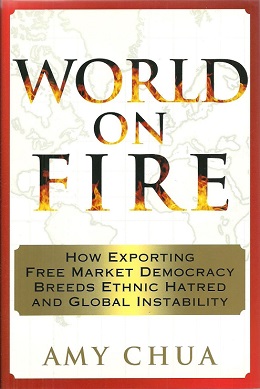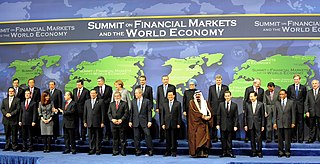Pax Americana is a term applied to the concept of relative peace in the Western Hemisphere and later in the world after the end of World War II in 1945, when the United States became the world's dominant economic, cultural, and military power.

Hegemony is the political, economic, and military predominance of one state over other states. In Ancient Greece, hegemony denoted the politico-military dominance of the hegemon city-state over other city-states. In the 19th century, hegemony denoted the "social or cultural predominance or ascendancy; predominance by one group within a society or milieu" and "a group or regime which exerts undue influence within a society".
Superpower describes a state or supranational union that holds a dominant position characterized by the ability to exert influence or project power on a global scale. This is done through the combined means of economic, military, technological, political, and cultural strength as well as diplomatic and soft power influence. Traditionally, superpowers are preeminent among the great powers. While a great power state is capable of exerting its influence globally, superpowers are states so influential that no significant action can be taken by the global community without first considering the positions of the superpowers on the issue.
Superpower collapse is the societal collapse of a superpower nation state. The term is most often used to describe the dissolution of the Soviet Union and the loss of the United Kingdom's superpower status through the decline of the British Empire.

World on Fire: How Exporting Free Market Democracy Breeds Ethnic Hatred and Global Instability is a 2003 book by American legal scholar Amy Chua. It is an academic study of ethnic and sociological divisions in the economic and political systems of various societies. The book discusses the concept of "market-dominant minorities", which it defines as ethnic minority groups who, under given market conditions, tend to prosper, flourish, and dominate economically, often significantly, over other, often ethnic majority groups in the country.
In international relations, power is defined in several different ways. Material definitions of state power emphasize economic and military power. Other definitions of power emphasize the ability to structure and constitute the nature of social relations between actors. Power is an attribute of particular actors in their interactions, as well as a social process that constitutes the social identities and capacities of actors.

A great power is a sovereign state that is recognized as having the ability and expertise to exert its influence on a global scale. Great powers characteristically possess military and economic strength, as well as diplomatic and soft power influence, which may cause middle or small powers to consider the great powers' opinions before taking actions of their own. International relations theorists have posited that great power status can be characterized into power capabilities, spatial aspects, and status dimensions.

In international relations, a middle power is a sovereign state that is not a great power nor a superpower, but still has large or moderate influence and international recognition.

In international relations, since the late 20th century, the term "regional power" has been used for a sovereign state that exercises significant power within a given geographical region. States that wield unrivaled power and influence within a region of the world possess regional hegemony.

The American Century is a characterization of the period since the middle of the 20th century as being largely dominated by the United States in political, economic, and cultural terms. It is comparable to the description of the period 1815–1914 as Britain's Imperial Century. The United States' influence grew throughout the 20th century, but became especially dominant after the end of World War II, when only two superpowers remained, the United States and the Soviet Union. After the dissolution of the Soviet Union in 1991, the United States remained the world's only superpower, and became the hegemon, or what some have termed a hyperpower.
Michael Mandelbaum is a professor and director of the American Foreign Policy program at the Johns Hopkins University, School of Advanced International Studies. He has written a number of books on American foreign policy and edited a dozen more.

Amy Lynn Chua, also known as "the Tiger Mom", is an American corporate lawyer, legal scholar, and writer. She is the John M. Duff Jr. Professor of Law at Yale Law School with an expertise in international business transactions, law and development, ethnic conflict, and globalization. She joined the Yale faculty in 2001 after teaching at Duke Law School for seven years. Prior to teaching, she was a corporate law associate at Cleary, Gottlieb, Steen & Hamilton.

The Chinese Century is a neologism suggesting that the 21st century may be geoeconomically or geopolitically dominated by the People's Republic of China, similar to how the "American Century" refers to the 20th century and the "British Centuries" to the 18th and 19th. The phrase is used particularly in association with the prediction that the economy of China may overtake the economy of the United States to be the largest in the world. A similar term is China's rise or rise of China.

Day of Empire: How Hyperpowers Rise to Global Dominance - and Why They Fall is a 2007 book by Yale Law School professor Amy Chua.

A potential superpower is a state or other polity that is speculated to be—or to have the potential to soon become—a superpower.
A maritime power is a nation with a very strong navy, which often is also a great power, or at least a regional power. A maritime power is able to easily control their coast, and exert influence upon both nearby and far countries. A nation that dominates the world navally is known as a maritime superpower.
The People's Republic of China emerged as a great power and one of the three big players in the tri-polar geopolitics (PRC-US-USSR) during the late Cold war (1956-1991), after the Korean war in 1950-1953 and the Sino-Soviet split in the 1960s, with its status as a recognized nuclear weapons state in 1960s. Currently, China has the world's largest population, second largest GDP (nominal) and the largest economy in the world by PPP. China is now considered an emerging global superpower.
American decline is the idea that the United States of America is diminishing in power geopolitically, militarily, financially, economically, technologically, demographically, socially, morally, spiritually, culturally, in matters of healthcare, and/or on environmental issues. There has been debate over the extent of the decline, and whether it is relative or absolute. Those who believe America is in decline are declinists.

The term foremost power has been used by political scientists and historians to describe the allegedly greatest power in the world, or in a given region, during a certain period of history. Multiple empires have been described as such, often for the same time period, resulting in a problematic assessment of the conflicting scholarly opinions and points of view on the matter. There is therefore a general lack of consensus between the various authors and scholars in reference to the nations and empires that were allegedly the world's most powerful at various points in history.










